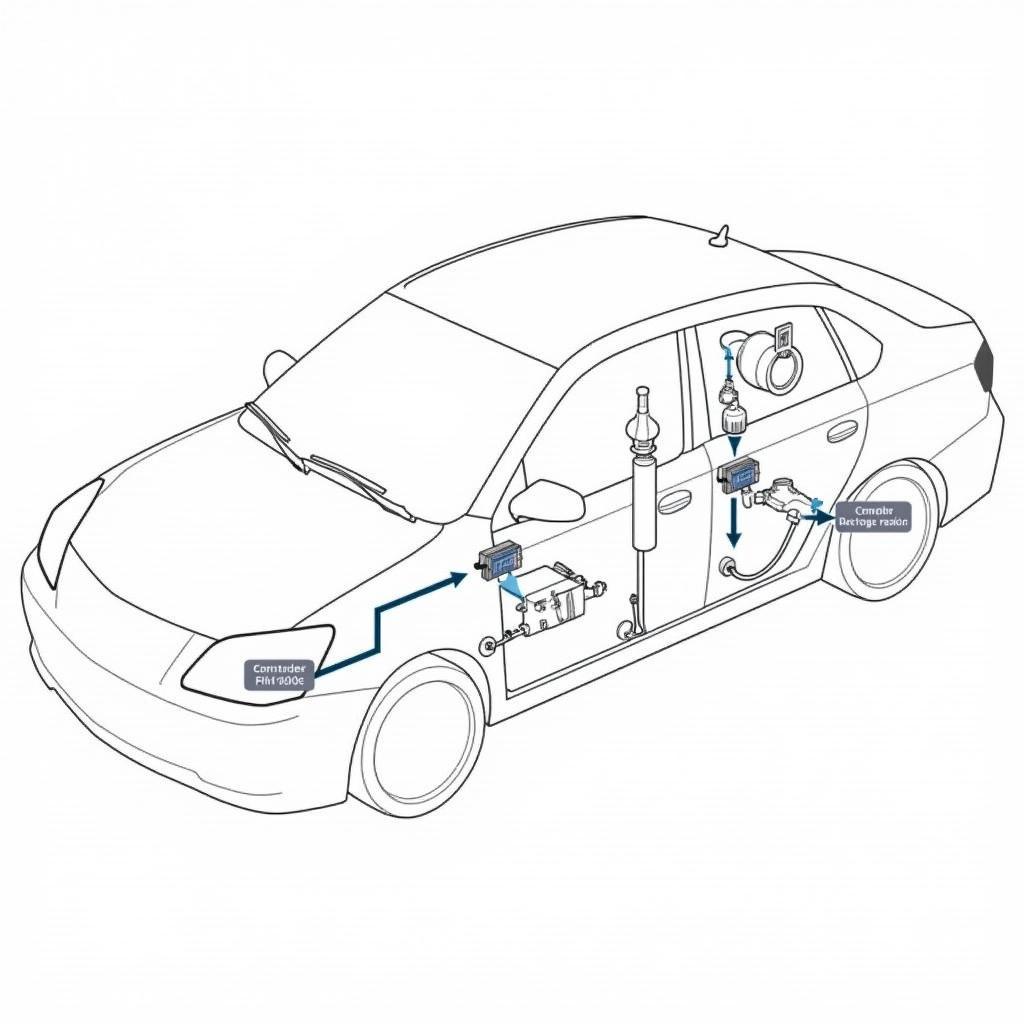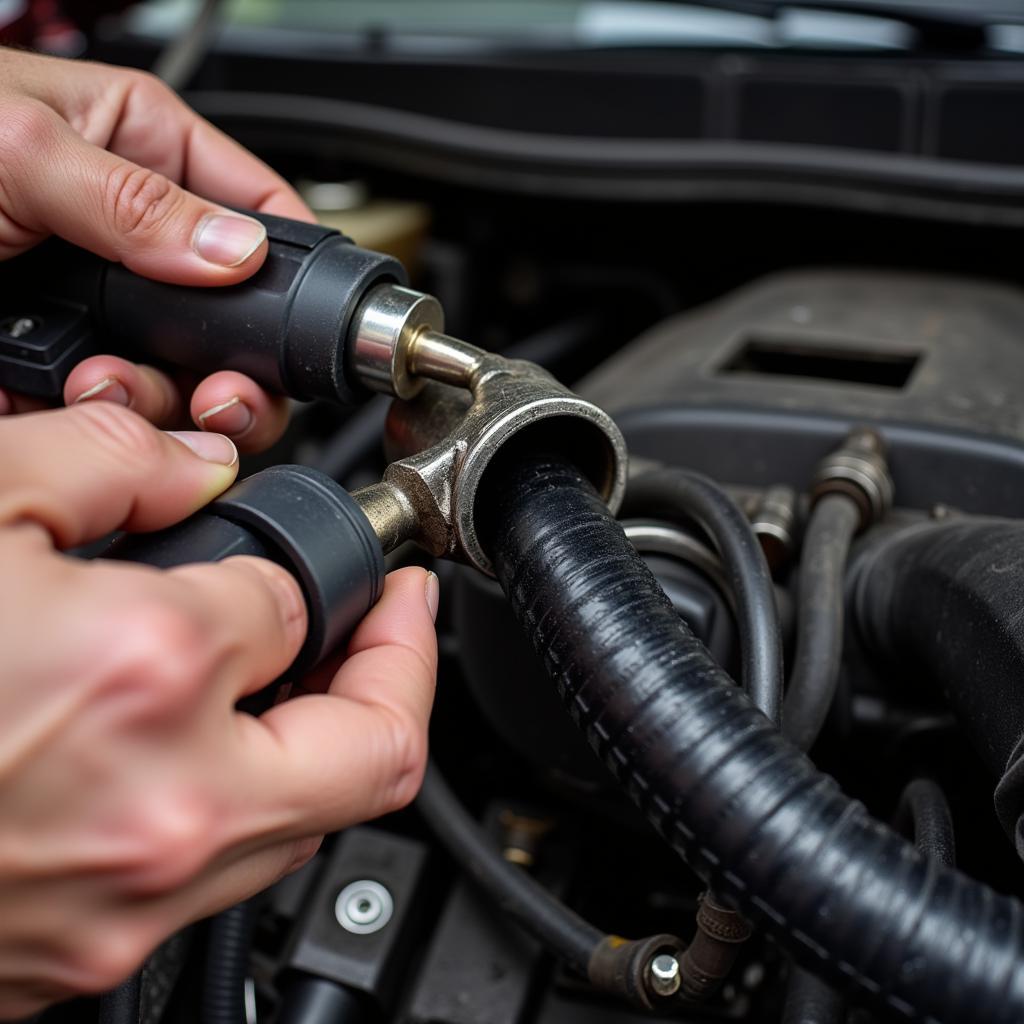A car’s AC is essential, especially during hot weather. A leak in your car AC can lead to warm air blowing from the vents, reduced cooling efficiency, and potentially damage to the entire system. Knowing How To Fix A Leak In A Car Ac can save you money and keep you cool.
Fixing a car AC leak isn’t always a DIY job, but understanding the process helps in diagnosing the issue and communicating effectively with a mechanic. We’ll explore the common causes of leaks, diagnostic methods, and repair options for a leaking car AC. Finding and fixing the leak early is essential to prevent further damage and costly repairs. You can learn more about specific types of leaks, such as those in the AC hose or evaporator, to better understand the potential challenges involved. For example, learn how to fix gas leak in car ac for more specialized guidance.
It’s crucial to remember that working with refrigerants requires specialized equipment and knowledge due to potential environmental and health hazards. While some minor repairs can be done at home, complex issues are best left to certified professionals.
Common Causes of Car AC Leaks
Several components in your car’s AC system can spring a leak. The most common culprits include:
- Hoses and connections: These can become brittle or cracked over time due to heat and vibration.
- O-rings and seals: These small but crucial components can dry out and crack, leading to leaks.
- Compressor: The heart of the AC system, the compressor, can develop leaks through its seals or body.
- Condenser: Located at the front of the vehicle, the condenser is susceptible to damage from road debris.
- Evaporator: Situated inside the dashboard, the evaporator can leak due to corrosion or damage.
Knowing where to look is half the battle. Understanding the function of each component helps pinpoint the likely source of the leak.
 Car AC System Components Diagram
Car AC System Components Diagram
Diagnosing a Car AC Leak
Identifying a leak requires a systematic approach. Here’s how to proceed:
- Visual inspection: Carefully examine all hoses, connections, and components for signs of damage, oil residue, or dye from a previous leak detection service.
- Pressure test: A professional can use specialized equipment to pressurize the system with nitrogen and identify leaks.
- Electronic leak detector: These devices can sniff out even the smallest refrigerant leaks.
- UV dye: A UV dye can be added to the system, making leaks visible under a UV light.
Proper diagnosis is essential to avoid unnecessary repairs. If you are unsure about any step, consult a qualified technician. You can find out the cost to fix a car ac leak to prepare yourself for the expenses involved.
DIY vs. Professional Repair: When to Call an Expert
While some minor AC leaks can be tackled at home, complex repairs often require specialized tools and knowledge.
“DIY repairs can be cost-effective for minor leaks, especially if you’re comfortable working on your car,” says automotive expert, Robert Miller, ASE Certified Master Technician. “However, complex leaks, particularly those involving the compressor or evaporator, are best left to professionals.”
 Mechanic checking car AC leak with UV light
Mechanic checking car AC leak with UV light
He adds, “Refrigerant handling requires specialized equipment and training due to environmental and safety regulations. Improper handling can be harmful.” For more complex repairs like fixing an AC hose leak, it’s always recommended to find out how much for fixing ac hose leak in car from a reputable repair shop.
Repairing a Car AC Leak
Once the leak is identified, the repair process can begin. This may involve:
- Replacing faulty components: Hoses, O-rings, seals, or even the compressor or condenser may need replacement.
- Repairing damaged parts: In some cases, minor leaks can be repaired with specialized sealants or epoxy.
- Evacuating and recharging the system: After the repair, the system needs to be evacuated to remove air and moisture, then recharged with the correct amount of refrigerant.
 Mechanic repairing a car AC hose
Mechanic repairing a car AC hose
Remember, working with refrigerants requires specialized equipment and knowledge. For instance, knowing how to fix ac evaporator leak in car requires a more in-depth understanding of the system. While simple fixes like fix leaking ac line car might be within the DIY realm, it’s often safer and more efficient to consult a professional.
Conclusion: Keeping Your Cool
Fixing a leak in a car AC is crucial for maintaining a comfortable cabin temperature and preventing further damage to the system. While minor leaks might be addressed with DIY solutions, seeking professional help is often the best course of action for complex issues or when dealing with refrigerant. Understanding the components, diagnostic methods, and repair options can help you make informed decisions about your car’s AC system. Need help with your car AC? Connect with us at AutoTipPro for expert advice and assistance. Our phone number is +1 (641) 206-8880 and our office is located at 500 N St Mary’s St, San Antonio, TX 78205, United States.







Leave a Reply